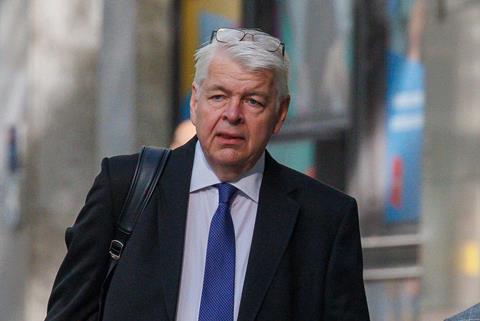The Post Office chose its lawyers partly based on the fear of coming across as too aggressive, the public inquiry into the Horizon scandal has heard.
Alisdair Cameron, chief financial officer for the organisation since 2015, also told the inquiry that a barrister giving litigation advice believed he had ‘caught the judge’s eye’ before the case was comprehensively lost.
Giving evidence on Friday, Cameron said a key failing of the Post Office had been that it did not balance ‘tactical battles with other priorities’ and that claims should have been settled years before.
‘We have defended ourselves inappropriately to avoid the consequences of our actions,’ he wrote in his written statement. ‘This has been a waste of public money and a postponement of justice.’
When he joined the organisation in 2015, Cameron said general counsel Chris Aujard, communications director Mark Davies and chief executive Paula Vennells were pushing the narrative that sub-postmasters’ claims for compensation were ‘opportunistic and unreasonable’, and that this was a waste of public money.
When the mediation scheme failed, and the prospect of litigation grew stronger, Cameron recalled that new general counsel Jane MacLeod (who is refusing to co-operate with the inquiry) held a ‘strong and unwavering view’ that making any settlement would trigger another wave of claims. MacLeod also believed that a settlement would prompt the Criminal Cases Review Commission to look again at convictions.

Cameron said legal advice then became ‘increasingly fixed in place’ and that MacLeod, external firm Womble Bond Dickinson and David Cavender KC became a ‘tight group that constantly reinforced each others’ views: an extreme example of groupthink’.
When the Post Office lost the so-called ‘common issues trial’ in Bates v Post Office, Cameron said this should have been a ‘seismic moment’ where the organisation stood back and reflected on its failings. Instead, he told the inquiry, the legal advice was ‘it’s the judge that’s the problem, crack on. You know, we’re not changing our position at all’.
At this time, Vennells questioned whether Womble Bond Dickinson was good enough but MacLeod held the line ‘very firmly’ that a ‘more assertive firm might make us look like bullies’.
Cameron now said: 'With hindsight, a more assertive firm would have seen the pitfalls and kept us out of court in the first place.'
Cameron told the inquiry: ‘My recollection was that Paula did question Jane to say, “Look, you know, are Bond Dickinson the right people for us?”, and Jane said, “Well, they’ve done an awful lot of work over the years and so they know a lot of information and that’s important”, which I completely accept.
‘But she thought this was about the optics, whereas, if we had employed a really big, aggressive City firm with that sort of reputation, we would have looked like corporate bullies. But my feeling is, actually, we looked like corporate bullies anyway because of the size of Post Office compared to the size of an individual post office, and we didn’t get very good advice; so it was the worst of both worlds.’
Cameron said he had challenged whether the Post Office should be concerned that Mr Justice Fraser was critical of the organisation ‘from the off’ in the common issues trial.
But when pushed on this, Cavender told colleagues he had ‘caught the judge’s eye and they were as one’. Cameron said Cavender believed Fraser was ‘just posturing so it didn’t look like he was against the claimants’.
When the common issues judgment came out, the board asked for a second firm to provide independent advice to challenge the legal team’s position. But Cameron said the board was not told that the KCs chosen for that advice, Lord Neuberger and Lord Grabiner KC, were from the same chambers.
Cameron told the inquiry: ‘I wanted someone new to come in and start with a clear mind, and not be trying to defend what had happened in the previous year. And so I was worried when, very quickly, Lords Neuberger and Grabiner came in.’
Cameron said he had to ask Cavender to stop referring to Fraser as ‘this awful judge’ in internal conversations, and he reflected now that the Post Office accepted ‘very bad legal advice’.






























